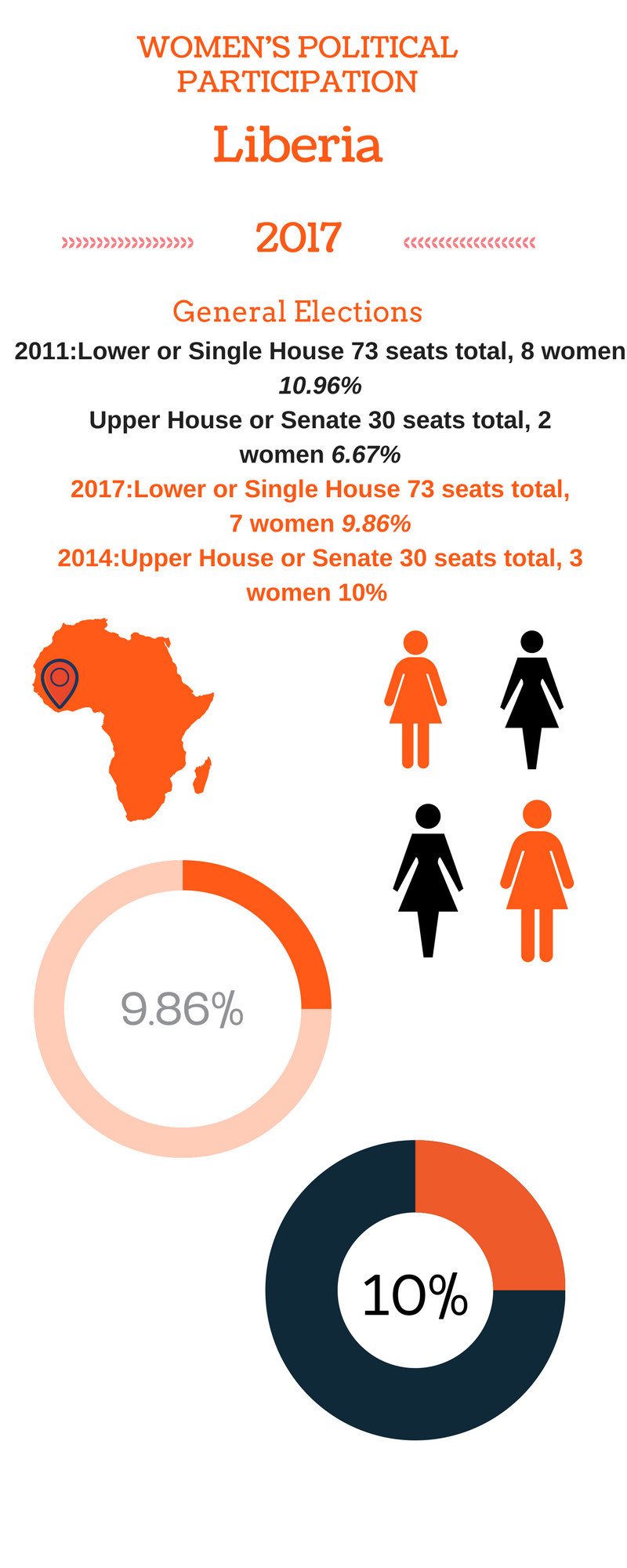Introduction
In 2017, a presidential election took place in Liberia in order to replace President Ellen Johnson-Sirleaf. In 2006, Ms Johnson-Sirleaf became the first elected female Head of State in Africa. She stayed in power until 2017 when she completed her second and final term.
The first round of the presidential election was held on October 10th 2017. 20 individuals were candidates, including 19 men and 1 woman. Although women were drastically underrepresented, it is important to note that the 1986 Elections Law was amended in September 2014, so as to include gender quotas. Notably, §4.5 now provides that “[a] list of candidates submitted to the Commission for an election should endeavor no less than 30% of the candidates on the list from each gender”.
The turnout for the first round was strong as 75.6% of the eligible voters cast their vote. George Weah won 38% and Joseph Boakai 29% of the votes. However, to win outright, a candidate needed more than 50%.
The second round was originally planned to be held on November 7th but was delayed. The Liberty Party alleged fraud in the first round of elections. While charges were examined, the Liberian Supreme Court halted the second round. The results of the investigation concluded that irregularities did not disturb the outcome of the first round.
A runoff presidential election was held on December 26 and George Weah won with more than 60% of the votes.
Women's Political Participation
Cooper Macdella B. was the only female candidate for the election. She was born in the 1970s in the capital Monrovia. When she was a teenager, her father was killed during the civil war[1] and she fled to the United States with her mother. She then became a successful model and founded the Macdella Cooper Foundation. The foundation offers education, health and economic support for orphaned children, women and the youth of Liberia.
Cooper Macdella B. announced her presidential ambition in October 2016. She won the primaries under the ticket of her party, Union of Liberian Democrats. After internal party disputes, her victory was cancelled. Cooper Macdella B. decided to join a newly formed party, the Liberia Restoration Party. She was successfully elected a few days before the deadline for nomination. Unfortunately, on October 10th 2017, she won only 0.7% of the votes.
On October 10th 2017, in addition to the Presidential election, elections were held for all of the House of Representatives. In Liberia, the members of the House of Representatives are directly elected, through a majority voting system, whereby the candidates who obtains the highest number of valid votes are appointed. Out of the 1,000 candidates, 165 were women. Only 7 women were elected, representing 9,86% of the total seats. These results are really similar to the ones of the previous elections of 2011 where only 8 women were elected.
Although women are underrepresented in the political sphere of the country, efforts have been made by the government to increase their participation. For instance, the National Election Commission (NEC) has organized a series of workshops on Gender and Disabilities in the Electoral Process, in order to strengthen women and people with disabilities’ participation in the political process. Moreover, the NEC has established Gender and Elections Coordinating Groups in each of the 15 counties of Liberia. In addition, in June 2017, the NEC adopted a “Gender Mainstreaming Policy”, with the aim of supporting gender mainstreaming in public and political life, and of countering those obstacles that hamper women’s full participation in decision-making and politics.
According to Liberia’s National Elections Commission, women constitute half of the over two million people who registered to vote during the 2017 General elections.
Conclusion
Despite the noteworthy governmental efforts in promoting women’s participation in the past elections, women continue to encounter significant obstacles in participating in political and decision-making activities.
Women are underrepresented in the political sphere and the results of the 2017 election continued in the same direction. Out of the 20 candidates to the presidential election, there was only one woman. In addition, only 7 women won a seat in the House of Representative, representing only 9.86% of the total seats.
In Liberia, there are still strong prejudices against women who speak out in public and engage in politics. Often, women are prevented from running for offices as a result of fear of intimidation and violence. Moreover, Liberian women have lesser control over economic resources, thereby lacking the funding to participate in the election processes. In many cases, they are still confined to household responsibilities and childcare.
[1] The Liberian civil war, begun in 1989, lasted 14 years, killed more than 200,000 people across four countries.

